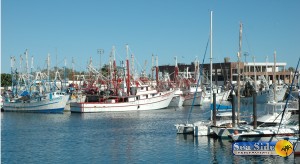
An armada of shrimping boats in the port of Puerto Penasco.
By Steve Schwab
The 2012 CEDO Environmental contest winners of “Team Los Delfines” have done more than identify the need for drastic changes in the fishing operations taking place in El Desemboque; they are sharing the information they have gathered with the fisherman of their village by organizing meetings and providing reasonable and amicable suggestions and solutions to concerns regarding the environmental and personal impact commercial fishing has had on their community. Since the early sixteenth century, most of the population of El Desemboque was involved with the extraction of the winged oyster (Pteria sterna), also known as mother-of-pearl oyster and black pearl oyster. The bivalve mollusk has been relentlessly exploited for its pearls, and less commonly for its meat and shell. Located in the upper Gulf of California, Mexico, in the state of Sonora, the village of El Desemboque faces several of the same tribulations plaguing the villages in Mexico that are reliant on Marine life for their livelihood, constantly struggling for a tenuous balance between economy and ecology.
With a strong desire to improve the economy of their village, while at the same time protecting the environment they live in, seven students from the sixth grade class of Himno Nacional Mexicano primary school, began to develop a project that would illustrate the necessity of improving the methods used in the gathering of the winged oyster, and to identify (through interviews) the concerns of the fishermen in regards to sustainability, job security and safety. Led by their instructor, the 11 and 12 year-old students collected data and gathered information from all sources, identifying six main issues impacting the future of oyster extraction in their region:
1) Improper handling of the shell and offal.
2) Not having effective cleaning of work areas.
3) No standards with regards to kilos per boat.
4) The over-exploitation of the product.
5) Not having a good pricing method of pricing product.
6) The lack of market for product.
From the outset, the students approached the subject with intensity and severity, concluding in their report “… without implementing sustainable fishing practices, the winged oyster could become extinct in our region, which would directly affect families residing in the community now and into the future, making the winged oyster fishery just a memory among the inhabitants…”
The results of their research was all encompassing, maintaining cautious optimism for the future of fishing, both for themselves in their hometown, and other regions of Mexico that rely heavily on marine life for their economy; while at the same time painting a dire picture of wonton exploitation of resources that coincided with an often careless disregard for human life as well.
The team’s work was awarded first place at CEDO’s 18th Environmental Contest. The parameters of the contest included economic viability while maintaining environmental sustainability. Judges included fishermen in the region and fishing authorities working in the areas impacted by commercial fishing. For the first place team, CEDO participated in implementing the teams contest proposal, helping to devise a way to effectively promote the winning proposals that had been presented. Utilizing their suggestion of gathering the community together to try to reach agreements to solve the problem, El Desemboque’s proposal seemed feasible to carry out, having already demonstrated the ability to bring the fishing community together while gathering the research for their proposal. With the help from CEDO, the team will meet with local fisherman in order to come to a viable agreement in regards to:
1) Divers spending too much time under water, increasing the risk of fatal accidents that are leaving children fatherless.
2) The price of the winged oyster being very low due to fishermen not being organized, and bidding prices against each other in order to make a sale.
3) Working together so that the fishermen will have one voice to the purchaser and maintain a reasonable price of the oyster.
4) Engage in fishing for other species, allowing the oyster population to recover between seasons.
5) Refusing to sell product to purchasers who do not respect the agreed-upon price.
The CEDO website summed up the results of the contest, and the winning team’s proposal the best, stating: “Perhaps someday, our children will be proud to tell the story of their community, how through agreements, discipline, righteousness, truth and unity, it was able to continue to fish responsibly and sustainably, co-existing with the unique and extraordinary animals of its environment.”
“CEDO” (from its name in Spanish, El Centro de Estudios de Desiertos y Océanos) opened its doors in Puerto Peñasco, Sonora, México, in 1980. Each year thousands of people participate in their research, education and conservation programs. CEDO maintains a biological field station for visiting classes and researchers. CEDO works with local communities, the government and visitors to understand and minimize the human impact on local environments and species. The mission of CEDO is “to advance and share knowledge about the Northern Gulf of California and surrounding Sonoran Desert and to promote the conservation and sustainable use of its natural and cultural resources.”
For more information, please visit the CEDO website at:
http://www.cedointercultural.org


